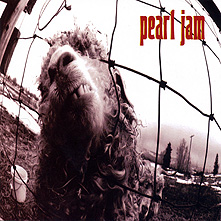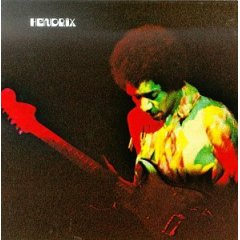You are currently browsing the category archive for the ‘Pop/Rock’ category.
I’m sure many of you have already seen the above meme on Facebook or wherever. My friend Aaron just posted an interesting article allegedly providing scientific backing to this meme’s overall point, that Pop music has deteriorated over the past 60 years. It is a common sentiment that modern mainstream music is less “intelligent” or “creative,” and the linked article claims to prove this.
People… this is absurd. EVERY generation thinks their music is superior to the next generation’s music. Is music different now than it was? Yes. Can the differences be qualified and compared/contrasted so that one era emerges as a “winner” in the complex and infinitely subjective world of art? I’ll let you figure out the answer to that one on your own.
I’m saying this because of my current kick regarding the way music affects people’s EMOTIONS. I’m more and more convinced that music’s real currency is its ability to manipulate one’s FEELINGS. Melodies, chords, volume levels… these things contribute to the overall impact of the music, but they are not mathematical formulas for success or failure.
Bottom line: Bieber’s millions of die-hard fans cannot be explained away by simply claiming that they’re idiots. His music AFFECTS them, just like Sinatra’s music has affected me.
As always… hit me with your feedback.
Sunny Day played on Fallon last night, and it was pretty rocking. For those who don’t know that band, they basically invented the Emo sound, or at least they’re the ones who really established it. They formed back in 1992 but broke up in 1995. When the group disbanded, drummer William Goldsmith and bassite Nate Mendel joined the Foo Fighters. Goldsmith was replaced by Taylor Hawkins in 1997, but I think Mendel still plays in Foo Fighters. In 2003 Enigk, Goldsmith, and Mendel put out a record under the name The Fire Theft, and it is medium awesome. Dan Hoerner, the 4th member of Sunny Day, also played with Dashboard Confessional for a little while.
Anyway, I have their second album, LP2, and the music is killing, interesting, passionate, and NOT sloppy (which is maybe the difference between emo and general indie rock). Watch how freaking hard William Goldsmith plays the drums. He’s bashing, but again, not in a sloppy or uncontrolled way. For anyone who was wondering, this is how rock drummers are supposed to play…
UPDATE: The youtube video I had posted is now removed for copyright reasons, so check out the direct link to NBC here.
 My friends at Food For The Beloved wrote a great post yesterday about Pop Music and the ambiguity surrounding that term. They’ve invited me to weigh in on the conversation, so that’s what this post is about. It’s probably best to read Lars’ original post before reading my thoughts below.
My friends at Food For The Beloved wrote a great post yesterday about Pop Music and the ambiguity surrounding that term. They’ve invited me to weigh in on the conversation, so that’s what this post is about. It’s probably best to read Lars’ original post before reading my thoughts below.
Ok, here we go…
In any discussion about Pop Music, I think it’s helpful to acknowledge and define the multiple uses of the term “Pop.” It seems that there are three:
The first definition: “Pop” as it refers to the sound/style of certain music. In this sense the term describes a genre – the section of the record store where one would go to find particular albums. These “Pop” albums, currently, would sound like something close to U2 or Phil Collins. However, “Pop” as a genre description has been and continues to be used quite broadly, at times referring to artists who have VERY different styles and genres. Wikipedia describes the “Pop” sound as “a lighter alternative to Rock and Roll… features a noticeable rhythmic element, melodies and hooks, a mainstream style and a conventional structure.”
The previous Wikipedia quote touches briefly on the 2nd definition: “Pop” as it refers to a level of commercial success. This usage is best understood as the shortened form of the word “popular,” and it’s almost perfectly synonymous with the term “mainstream.” Pop in this sense is a very unhelpful term, in my estimation, because popularity hinges on so many factors outside of actual music. Era, promotion, politics, reputation, appearance… there are plenty of ways to achieve massive popular success without having a Pop genre/style, not to mention the quality of the music. Furthermore, the whims and trends of culture will shift at least two times each decade, only adding to the difficulty of labeling music according to it’s popularity. These often abrupt shifts in pop culture also make predicting the next “Pop” trend nearly impossible.
The third definition expands on the idea that music’s popularity is predictable: “Pop” as it refers to the commercial intent of music. For this definition I prefer to use the term “calculated music.” Calculated music is a business model, a market play, an investment. Calculated music attempts to use the flow of culture’s “hip factor” to determine what genre/style of music will be the next big thing, and jump on that bandwagon in time to turn a large profit. Calculated music will reflect any given genre/style, but by definition the calculated music will only be found in a genre/style that has potential for mainstream success (i.e., NOT jazz or classical or avant-garde… but often Pop).
As I said initially, a conversation about Pop Music will inevitably weave it’s way through these three uses of the term “Pop,” so it’s good to get them on the table at the outset. Now that we have that taken care of, I’ve got some general observations and responses regarding Lars’ post from yesterday. For clarification’s sake, I’ll use “Pop” only according to my first definition, and I’ll use “mainstream” and “calculated music” in referring to the other 2 definitions…
– Pop music is fine. I like it. Coldplay, John Mayer, Justin Timberlake, etc… a lot of Pop music is super cool. In fact, I have no principled objection to ANY style of music. Every genre offers both quality and crappy art, so I just do my best to sort through it all.
– I have nothing against mainstream music. Just because music is liked by tons of people doesn’t mean that the music lacks depth or artistic integrity. However, in the same way, just because music reaches mass popularity doesn’t mean that it is automatically awesome. My comment regarding all the various genres of music and the fact they all include both quality and crap – this applies to the mainstream as well.
– Calculated music, although often succesful in the business sense, is annoying to me because it betrays the original existence and purpose of art.
– Pop music contains many appealing and accessible qualities, and for this reason the majority of today’s mainstream music can be accurately placed in the Pop genre. This accessibility in Pop also means that the music is often easy to understand and digest. This is not a problem, but it does somewhat represent the lagging state of the current mainstream. In past generations, a highly complex and less accessible style of music did not immediately eliminate the possibility of mainstream success, but unfortunately that is the case today. Does this mean that today’s mainstream has dumbed down it’s comprehension and preference for music, or are many music fans just getting lazy? Possibly both.
– Ironically, it seems calculated music rarely achieves the long-lasting mainstream success that it seeks. This is most likely due to the fact that passionate music fans can sniff out calculated music, and it annoys them for the same reason it annoys me. Your “every-day-Joe” (the guy who just listens to the radio on his work commute), will respond equally to music that is calculated and music that is truly expressive. However, the genuine music fan will only REALLY respond to genuine music (i.e., artistically expressive music… whether that be Pop or Rock or Hiphop or whatever). This means that an artistically sincere musician who successfully creates cool Pop music will attract both the genuine music fan and the every-day-Joe, while the calculated music will only ever be able to snag the every-day-Joe.
DISCLAIMER: Please take all of my thoughts on this issue with a grain of salt, obviously. I definitely don’t know for sure about any of this, these are just observations that seem to coincide with the music world that I’m regularly apart of. I’d love to hear differing viewpoints on these issues.
I’m going a different direction for Album of the Week this time around. Instead of a record I’ve been listening to lately, I want to turn everybody on to an older album that had a huge role in shaping me when I was younger: VS, by Pearl Jam. I got this album when I was 13, and even now (15 years later) I still love it.
VS was Pearl Jam’s second record. Ten, their debut recording, was a huge international success, selling over 12 million copies. In line with Eddie Vedder’s typical “anti-establishment” style, the band went a completely different direction for their sophomore release, recording an album with much more raw and aggressive songs and a less “produced” sound. Compared to Ten, the VS album had no real radio singles, and the band produced no music videos for any of the tracks. It is all the more impressive, then, that VS sold over 7 million copies and is commonly cited as the “fan-favorite” in Pearl Jam’s discography.
The best part of this record is the energy. I actually can’t think of a rock record that has more “pump-up” from track to track, and yet keeps the songs somewhat diverse and artistically interesting. The drum performances on this album, recorded by Dave Abbruzzese, were the single most prominent influence on the early formation of my view on what a “rock” drummer should sound like. The most notable examples would be “Go” (track 1), “Daughter” (track 3), “Rats” (track 9), and “Leash” (track 11). My all-time favorite Abbruzzese track is a B-side from the VS sessions, called “Alone” (which can be heard on the Lost Dogs B-side compilation).
I should say at this point that, after studying the drumset for 15 years since first hearing VS, I don’t think of Abbruzzese’s performances on these tracks as perfect. In fact, I find new “flaws” every time I listen to it. That’s the way it works – you grow as a musician and, over time, things that once seemed amazing become less and less impressive. However, I will still always cite this recording as a huge part of my early development as a drummer.
For those of you who haven’t seen Episode 4 of the video lesson series, “Go” (the opening track of VS) gets a shout-out as a great example of the “4 on the snare” groove.
Sidenote: I have a love/hate relationship with Pearl Jam’s drummers. “Ten” was ghosted by studio drummer Matt Chamberlain, and Abbruzzese played on both “VS” and the third Pearl Jam record, “Vitalogy.” I am a big fan of both Chamberlain and Abbruzzese, and these guys really helped to shape Pearl Jam’s sound. But then, after the Vitalogy record, Vedder fired Abbrusseze and got ex-Chili Peppers drummer Jack Irons. Then, after Soundgarden disbanded, Vedder picked up Matt Cameron, who remains the Pearl Jam drummer today. In a rare moment of printed criticism, I will boldy state that both Irons and Cameron are awful… in fact, I can’t decide who sucks more. Probably Cameron actually, who has been in Pearl Jam for ten years now and has only gotten WORSE.
Next up in the series is some Jimi Hendrix. I’ve been listening to a lot of Hendrix lately, and I think his final album, “Band Of Gypsies,” is the best choice for Album of the Week. I cannot believe how incredible this record is. Every time I listen to it I am inspired.
In 1965, before he was famous, Hendrix signed a vague contract with Capitol Records that was never fulfilled. In 1969, at the height of Hendrix’s career, the people at Capitol figured out that they still had some contractual obligation from Hendrix (who was on MCA records at the time), and they approached him about doing an album. In an attempt to quickly follow through on the Capital contract and get it out of the way, Hendrix called in some friends for a new band under a different name and planned a two-night stand at The Fillmore for New Year’s Eve. The “Band Of Gypsies” recording is the result of those performances, comprised of six live tracks taken from the two nights, and featuring Hendrix on guitar/vocals, Billy Cox on bass, and Buddy Miles on drums/vocals.
From top to bottom the album is the perfect blend of groove, creativity, passion, and energy. I will go to the mat defending “Machine Gun” as the most emotional guitar solo in rock history. “Who Knows” features and incredibly musical vocal solo by Buddy Miles, made even more incredible by the fat groove that Miles is laying down while singing the solo. “Power Of Love” is the most killing bass line I have ever heard (which happens to be quoted on the latest John Mayer release).
This album is also a great example of improvisation in a rock context. Due to the abrupt nature of the decision to make the record, the band was not afforded much rehearsal time. They rely on improvisation for at least 70% of the performances, and they display impressive maturity and musicality in doing so. It’s worth noting here that there are some “sloppy” sections… meaning, the improvised nature of the music is not conducive to the “perfect” production quality of, for instance, the previous Album of the Week. However, this sloppiness is far outweighed by the emotional power of music that is (successfully) spontaneously composed. I believe musicians who are listening to one another and responding accordingly in the heat of the moment are able to reach a deeper artistic realm than calculated, pre-meditated music. The Band of Gypsies recording is my proof.
For drummers, Buddy Miles’ playing on this record is a lesson in itself. He is so patient, understanding that the trio revolves around Hendrix and not his own drumming. His grooves are so deep, and his improvising is very supportive of the trio’s sound. I especially love his snare tone… high and tight, but with a substance to the crack that you don’t normally find in drums that are cranked up.
You can buy the album here, you can read more about the interesting history of the recording here, AND there are some videos of these famous tracks here.
A ton of people that I respect have told me about this band “Jellyfish” for years… and I never listened to them. Then last year I finally bought their banner recording “Spilt Milk.” I cannot believe it. I listened to it again today and still cannot believe it. It is so incredible on so many levels. If you’re not already familiar with that record, go buy it immediately.
Anyway, the main subject of this post is Andy Sturmer, Jellyfish’s lead singer and drummer. That’s right, playing drums AND singing lead. And standing up while he does it. Watch this video of them live on the BBC and behold the wonder that is Andy Sturmer. This guy’s feel, sound, ideas, everything… all perfect. I believe Andy is currently in an ELO tribute band called “LEO.”
Long live Andy Sturmer.







Recent Comments